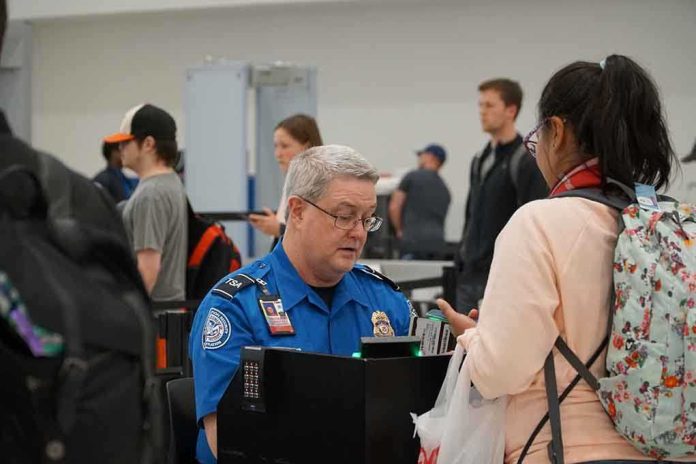
Seven airline personnel were hospitalized after a mysterious jet fuel odor infiltrated an American Airlines flight at Charlotte Douglas Airport, causing serious respiratory distress for one victim.
Key Takeaways
- Six crew members and one gate agent were hospitalized after exposure to a noxious odor, suspected to be jet fuel, on American Airlines flight 2055 bound for Los Angeles
- One person suffered serious symptoms while six others experienced minor respiratory issues, with all victims later released from hospital care
- The incident occurred before passengers boarded the Airbus A321, which American Airlines subsequently removed from service for a thorough inspection
- The medical emergency compounded existing chaos at Charlotte Douglas International Airport, where 731 flights were delayed and 132 canceled due to technology issues and weather-related ground stops
Dangerous Fumes Ground American Airlines Crew
A mysterious and potentially dangerous odor at Charlotte Douglas International Airport sent seven airline employees to the hospital on Friday, June 27, in what quickly became a serious health incident. The affected individuals—six crew members and one gate agent—were preparing American Airlines flight 2055 for its departure to Los Angeles when they began experiencing respiratory symptoms from an unknown airborne substance. Emergency services were immediately called to the scene as the situation escalated from routine pre-flight preparations to a full-scale medical emergency requiring hospitalization.
“On Friday (June 27), an odor at Charlotte Douglas International Airport in North Carolina led to the hospitalization of seven people,” stated Mecklenburg Emergency Medical Services Agency (Medic)
According to the Mecklenburg Emergency Medical Services Agency, one of the affected individuals suffered serious symptoms requiring urgent medical attention, while the other six presented with minor respiratory issues. Medical personnel responded quickly, initially treating the victims at the airport before transporting them to local hospitals for more comprehensive evaluation. Initial reports suggest that the smell might have been related to jet fuel, a hazardous substance that can cause serious respiratory distress when inhaled in concentrated amounts.
Swift Response Prevents Passenger Exposure
The timing of the incident proved fortunate for travelers, as the noxious fumes were detected before any passengers had boarded the Airbus A321 aircraft. American Airlines made the immediate decision to remove the plane from service, allowing their maintenance team to conduct a thorough inspection to identify the source of the dangerous odor. This swift action potentially prevented dozens or even hundreds of passengers from being exposed to the same harmful substance that sent crew members to the hospital.
“The individuals, including six crew members and one gate agent, experienced inhalation symptoms from an unknown substance,’’ according to the Mecklenburg Emergency Medical Services Agency (Medic).
An American Airlines spokesperson confirmed that after receiving initial medical attention at the airport, the affected crew members were transported to a nearby hospital for more comprehensive medical evaluation. This incident led to the immediate cancellation of flight 2055, with the airline scrambling to arrange alternative transportation for passengers who had been scheduled to depart on the affected aircraft. Fortunately, all seven hospitalized employees have since been released, though the airline has not disclosed the specific nature of their symptoms or treatments.
Airport Operations Thrown Into Chaos
The medical emergency came at a particularly challenging time for Charlotte Douglas International Airport, which was already experiencing significant operational disruptions due to multiple unrelated issues. A technology malfunction affecting American Airlines’ systems had created scheduling difficulties throughout the day, and the Federal Aviation Administration had imposed a ground stop due to severe weather in the region. These compounding problems resulted in a staggering 731 flight delays and 132 outright cancellations.
“A spokesperson for American Airlines confirmed that the crew received medical attention on-site and were subsequently transported to a nearby hospital for further evaluation,” stated A spokesperson for American Airlines
The mystery surrounding the exact nature of the odor raises serious questions about aircraft maintenance protocols and air quality monitoring at one of the nation’s busiest airports. While jet fuel is the suspected culprit, neither American Airlines nor airport officials have confirmed this determination, suggesting that the investigation remains ongoing. This incident highlights the potential health hazards faced by airline personnel who routinely work in environments where exposure to aviation fuels and chemicals is an occupational risk that can sometimes lead to serious medical consequences.



